In a society that bombards us with images of perfect lives, airbrushed bodies, Facetuned selfies and unachievable beauty standards, social media has awoken a beast within us that craves online validation.
As human beings, we desire acceptance and reassurance in everyday life, but it seems that when it comes to social media, the hunger for acceptance – in the form of likes and followers – is especially important to us.
Whenever we share a new selfie it is often because we feel good about our appearance and any form of agreement of this is very much desired. Likes are little representatives of “yes, you look really good in this photo”, and there’s a high chance we may sit refreshing the post in the hopes of seeing like after like trickling into our notifications.
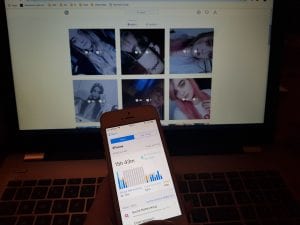
Apple’s Screen Time feature shows I spend, on average, around 3-4 hours on social media a day, that amounts to almost 30 hours a week.
On average, I spend around an hour or so taking selfie after selfie, trying to get the perfect angle and lighting to hide any flaws. Much of them will probably look exactly the same to the untrained eye, but I can definitely spot the difference. After spending so long staring at each photo with a critical eye, I can easily pick out every little detail of myself that I loathe, and I find myself swiping vigorously through each photo to do just that.
This process is frustratingly arduous and can be very depressing, but once I’ve taken a photo that I deem worthy of being shared with the online world, I then start craving the rewards.
Studies have found that gaining positive interactions on our posts, such as likes, gives us a high. Psychologist Emma Kenny stated that the interactions kick off “a reward cycle” in which we “get a squirt of dopamine every time you get a like or a positive response on social media”.
The desire for gaining likes comes from the fact that they are the social currency of the online world, and the more we have, the richer we feel in terms of positivity and self-esteem.
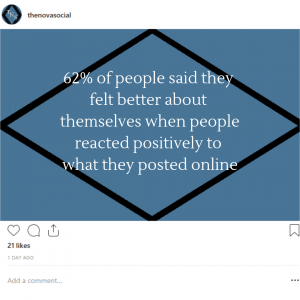 The impact this has on our own mental health and self-esteem is a cause for concern, however, and even the Duchess of Sussex Meghan Markle has spoken out about this matter, sharing from her own experience that “your judgement of your sense of self-worth becomes really skewed when it’s all based on likes”.
The impact this has on our own mental health and self-esteem is a cause for concern, however, and even the Duchess of Sussex Meghan Markle has spoken out about this matter, sharing from her own experience that “your judgement of your sense of self-worth becomes really skewed when it’s all based on likes”.
A study, which surveyed around 1,500 14 to 24 year olds in 2016, found that Instagram was one of the worst social media platforms for exasperating low self-esteem and mental well-being in young people.
The social currency of likes online is a double-edged sword, whilst we can receive a boost in confidence and self-esteem from gaining likes, we can similarly lose confidence and feel a plummet in our self-esteem if our posts do not amass a certain number of likes.
24-year old blogger Katie Williams admitted that she keeps track of her likes on Instagram.
“I usually get around 30 likes, which is pretty average, and when I post a selfie, I feel better when I get more.”
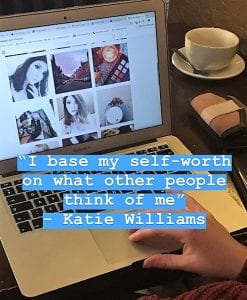
As part of the blogger community, Katie follows fellow bloggers and many popular influencers who all get a lot of likes, up to hundreds and even thousands.
“I feel I need to compete with them. I try to post at peak times, so between 4 and 6pm, and if I post outside of that I usually delete the photo and repost it when I know it is more likely to gain likes.”
This attitude unfortunately is not uncommon; criminologist graduate and self-confessed ‘social media butterfly’ Beth Dunbar, 22, shared similar experiences with Instagram. 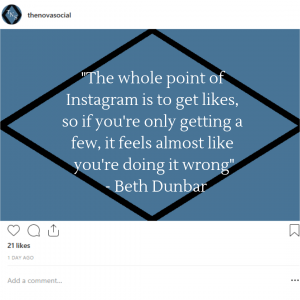
“I [frequently use] Twitter, Instagram, and Facebook, mostly the first one, and overall I like being on social media to keep in touch with friends and meet people with similar interests, but there is a darker side to it all.
Instagram used to be a big source of insecurity for me, I felt like my posts had to have a certain aesthetic and if they ended up not fitting, I would delete them and sometimes repost edited versions.
I’m sure it did annoy people who followed me, but I couldn’t help it, it would eat away at me. I even did a mass delete of posts because putting that amount of stress into posts and getting barely any likes felt bad.”
The negative effect that this pressure of fitting into a certain aesthetic to gain likes and comparing your own self-worth to other people online is particularly detrimental to the mental health of young people, and can exasperate low moods and self-esteem.
One person who knows all too well the negative impact of the photo and video sharing network Instagram is 19-year old Charlotte Stanbra.
Charlotte, a freelance journalist for Exposed Magazine and a Journalism Student at Sheffield Hallam University, was diagnosed with anxiety and depression in December last year. She has since deleted her Instagram account due to the negative effects it had on her mental health.
“I found that I was comparing myself to other females based on their body image and online persona. I felt like there was a pressure to look a certain way.
This not only impacted my mental health, but my physical health too. It led me to taking up extreme dieting, which led me to lose a lot of weight.”
Deleting her account was not easy, however, and for the first week or so she found herself checking back on it in fear of missing out on something. 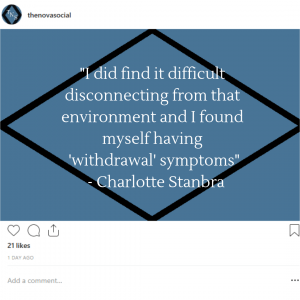
Despite the struggles, the disconnect has been worthwhile. “I still struggle with anxiety and depression in a self-image sense, but since deleting my account I’ve not been feeling as body conscious.”
The insecurities of self-image and body consciousness that young people are facing online is alarming, however, through the negativity of it all there has been positive movements breaking out.
Through charities such as See Me Scotland, young people are being urged to be candid with their posts. Speaking with BBC Timeline earlier this month, Danya Hastings-Mackenzie introduced the campaign #myunfilteredlife, saying that “we know what we see on social media isn’t real all the time, and if you’re struggling with your mental health, seeing these images that are projected in a way that are meant to make things look perfect, can be quite damaging and can make you feel very alone”.
The campaign has so far accumulated 4,425 posts (at the time of publishing) – from selfies with no filters, make-up, or Facetune, to photos of unmade beds, cluttered desks and medication. People have been sharing any and every aspect of their life to quash the stigma of the perfect life and perfect image/body and help create a more positive and accepting environment.
If you have a story of your own experience with social media and wish to share it with us, please get in touch via email: thenovasocial@outlook.com or drop us a comment below.
Please note, we are not able to provide any support and advice to people in mental distress, but if you are affected by any of the issues raised in this article and wish to seek support and advice there are a number of places you can contact below.
Helplines:
• Papyrus – for people under 35
Call 0800 068 41 41 – Monday to Friday 10am to 10pm, weekends 2pm to 10pm, bank holidays 2pm to 5pm
Text 07786 209697
• Campaign Against Living Miserably (CALM) – for men
Call 0800 58 58 58 – 5 pm to midnight every day
Visit the webchat page
• Samaritans – for everyone
Call 116 123
Email jo@samaritans.org
• Childline – for children and young people under 19
Call 0800 1111 – the number won’t show up on your phone bill
• The Silver Line – for older people
Call 0800 4 70 80 90
Talk to someone you trust
• Let a family member or friend know how you’re feeling. They may be able to help you and offer a strong support network.
Please note, if you have seriously harmed yourself or intend to, call 999 for an ambulance.